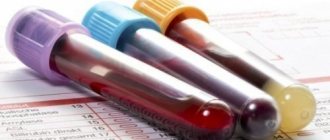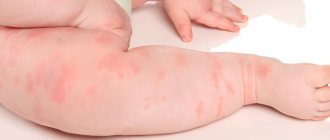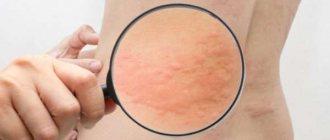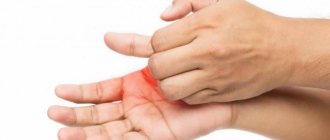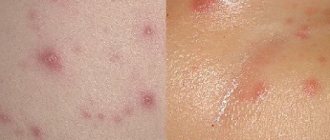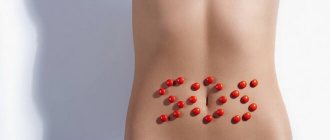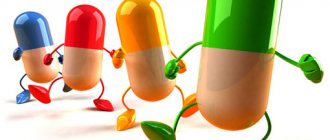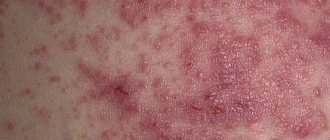How long does it take for hives to go away? Is it possible to get rid of it quickly?
Reading time: 3 min.
Urticaria or urticaria is a disease that in most cases is of an allergic nature and appears when a person comes into contact with any irritant: plant pollen, a pharmaceutical drug, a food product, a chemical substance, etc. In this case, voluminous bright pink blisters form on the body, filled with fluid, which are very itchy and painful to the touch.
Most often, rashes appear on the face and open areas of the body, which causes a person not only physical, but also moral suffering, interfering with the usual way of life. Psychological discomfort and the inability to communicate normally lead to nervous breakdown and can cause stress.
Therefore, everyone who is faced with manifestations of urticaria is interested in how quickly the symptoms of the disease will disappear and what methods can speed up recovery.
How many days does hives last?
The main reason for the appearance of symptoms of urticaria is a large amount of histamine, which is released into the blood upon contact with an allergen. At the same time, the walls of the capillaries become more permeable and fluid accumulates in the subcutaneous layer, which leads to the formation of blisters and itching.
Dermatologists distinguish two forms of urticaria:
- spicy. It appears unexpectedly and “gains strength” over a short period of time. The rash may disappear within a few hours, sometimes days. In some cases, symptoms of urticaria will last up to 6 weeks;
- chronic. This form of the disease is characterized by alternating acute relapses with periods of remission. At the same time, the number of allergens that cause urticaria may increase, and attacks become more intense. Chronic urticaria can last from 6 weeks to several months or years.
The length of time from the onset of urticaria symptoms to their complete disappearance depends on several factors:
- how quickly the allergen that provoked the disease was identified;
- whether contact with the irritant is immediately eliminated;
- what stage the disease is at;
- whether treatment was started in a timely manner;
- whether the sick person has concomitant diseases or other aggravating factors;
- what state is the immune system in?
In addition, the age of the patient should be taken into account. For adults, especially older and elderly people suffering from chronic diseases of the digestive, endocrine or cardiovascular systems, it is more difficult to get rid of the symptoms of urticaria than for children.
At the same time, a small child’s immunity is not yet sufficiently developed, so his body is not always able to quickly cope with diseases.
Thus, it is possible to talk about specific timing for eliminating the clinical manifestations of urticaria only after examining the patient and compiling a complete history of the disease. This should be done by an allergist or dermatologist, who will not only conduct a diagnosis, but also prescribe treatment.
How to quickly get rid of a rash?
As a rule, the most unpleasant sensations with urticaria are skin rashes and itching. To eliminate them as quickly as possible, you must use the following recommendations:
- wipe the affected areas of the skin several times a day with any alcohol solution (vodka, cologne, tinctures of medicinal plants, etc.);
- apply a paste of baking soda and water to the blisters;
- use applications made from grated raw potatoes;
- make lotions from oatmeal steamed in hot water.
To eliminate the symptoms of urticaria, antipruritic and antiallergic agents should be applied to the site of the rash:
- Psilo balm;
- Zinc ointment;
- Soventol ointment;
- Skin Cap ointment;
- La Cree cream.
If necessary, you can take an antihistamine tablet:
- Cetrin;
- Gismanal;
- Allergostop;
- Claritin;
- Erius.
If, despite the above measures, a person’s condition worsens: swelling increases, breathing becomes impaired, a “barking” cough appears, you should immediately call an ambulance. In severe cases, urticaria can be complicated by Quincke's edema or anaphylactic shock, which threaten not only health, but also human life.
Methods to speed up recovery
To increase the effectiveness of treatment and speed up recovery, doctors advise using the following recommendations:
- in the first two days after the onset of urticaria symptoms, refuse to eat and drink 2-2.5 liters of mineral water. Then gradually introduce water-based porridge, boiled vegetables, whole grain bread and other hypoallergenic foods into the diet. You need to adhere to this nutrition system for at least 2 weeks;
- do not smoke or drink alcohol;
- wear loose-fitting clothes made from natural materials;
- use only hypoallergenic cosmetic products;
- avoid stressful situations, do not be nervous;
- When cleaning, washing dishes and other work involving the use of chemicals, use gloves and other personal protective equipment.
When taking care of getting rid of urticaria as quickly as possible, you must not forget about strengthening your immune system. To do this, you should spend more time in the fresh air, exercise, and take vitamin supplements.
Source: https://KozhaExpert.ru/krapivnitsa/skolko-dlitsya
Diagnostic methods
After the first signs of urticaria appear, it is necessary to analyze the possible causes of its occurrence and observe how long the symptoms will remain most pronounced. The reasons why urticaria does not go away even after the second month of treatment include:
- medicines;
- food agents;
- household irritants;
- chronic pathologies;
- physical exercise;
- prolonged depression;
- hormonal imbalance;
- unfavorable external factors.
When possible irritants are eliminated and the body is reinforced with drugs that neutralize allergens - antihistamines, the urticaria will go away.
But the cause of persistent urticaria can also be the idiopathic form of the disease.
This is exactly the case when acute periods can last several months and be replaced by remissions lasting up to six months.
Diagnosing urticaria, as a rule, does not cause difficulties for a therapist or allergist-immunologist. However, in cases where the disease does not go away for more than 2 months, and traditional antihistamines for this treatment do not help, a more in-depth and thorough examination of the patient is required. It includes:
- collecting a general medical history;
- general and biochemical blood test;
- Analysis of urine;
- liver tests;
- test analysis to determine the allergen irritant;
- examination for the presence of parasites in the body.
After studying all the data, you may need the help of specialists such as a urologist, dermatologist, gastroenterologist to identify concomitant pathologies that provoke urticaria. If specialists in their field do not find any abnormalities, the patient is diagnosed with idiopathic urticaria and taken under control.
- a correctly collected anamnesis is the key to success (atopic reactions in childhood, connection with a food product or other substance, there were already similar symptoms);
- examination (visually identifying blisters, complaints of itching);
- skin tests will help find the specific cause;
- provocative tests with a possible allergen;
- determine general and specific Ig E;
- Complete blood count (increased eosinophils, ESR);
- Fecal analysis for helminthiasis, since Giardia often causes allergic reactions;
Provocative tests:
- when using cold objects, such as ice, applying it to the skin for a few minutes can reveal an allergy to cold;
- a similar procedure using heat, after 10 minutes the skin is examined for rashes;
- You need to hold your hand under running water, then evaluate the result - aquagenic urticaria;
- using the most common allergens: house dust, plant pollen, food.
Special dilutions of allergens of different concentrations are used. They are applied to:
- skin;
- nasal mucous membranes;
- conjunctiva;
- There is also an inhalation route of administration.
The safest is a skin test, when an allergen is applied to an area of skin, for example, the inner side of the forearm, and the reaction is observed.
Allergy hives how long does it take to go away
So, hives, how long does this condition last? Usually the symptoms of urticaria disappear after a few hours or days, although the normal course of the disease is about 6 weeks. How long urticaria lasts in adults depends on the individual characteristics of the body.
It will occur periodically whenever there is contact with a new allergen.
https://www..com/watch?v=8uL3Mke1LZI
But it can also occur constantly if there is frequent contact with irritants.
https://www.youtube.com/watch?v=mJ1h_MGOGi4
If the provoking factors disappear, the problem may be eliminated.
It is impossible to predict the course of the disease if it is caused by a pathology of internal organs.
It all depends on the severity of the concomitant disease and its characteristics.
Only a doctor can provide information about the possible time frame for cleansing the skin.
According to the classification, urticaria is divided into two types:
- Spicy. It occurs suddenly and lasts less than two days, but it can also take much longer. In some patients, episodes recur. Symptoms of this type of hives go away on their own, but taking medications or corticosteroids will greatly speed recovery.
- Chronic. The cause is still unknown. It lasts a long time, over 6 weeks. The rash may go away on its own, but without treatment the symptoms will return.
Does hives go away on its own? Most often yes, but sometimes it requires taking special medications.
The peculiarity of a child’s body is the speed of all processes. The child’s reaction quickly manifests itself and also passes quickly. Allergic urticaria disappears within 24 hours in the absence of contact with the allergen.
The chronic form of urticaria against the background of general health (no systemic lupus erythematosus, tonsillitis, etc.) practically does not occur in children.
It will occur periodically whenever there is contact with a new allergen.
But it can also occur constantly if there is frequent contact with irritants.
It is impossible to predict the course of the disease if it is caused by a pathology of internal organs.
It all depends on the severity of the concomitant disease and its characteristics.
Duration of treatment
If signs resembling urticaria appear, you should urgently consult a specialist. You may have to undergo laboratory tests.
Timely treatment will speed up the elimination of skin rashes and prevent complications. If hives are not dealt with, the blisters will merge into a huge neoplasm.
The disease will be complicated by swelling and rash on the mucous membrane. Anaphylactic shock and even suffocation may occur, leading to death.
How long will treatment take, how long does it take for urticaria to go away in adults?
If the allergen is identified and eliminated, the symptoms disappear within two days.
The acute form of the disease, thanks to taking antihistamines, goes away in one day.
The itching disappears immediately. Blisters and redness will take longer to resolve.
It will take at least two weeks for the skin to regenerate.
For chronic urticaria, the same therapy is used or a combination of drugs is used. Sometimes antihistamines do not help, then the doctor prescribes oral corticosteroids. With this treatment, the disease is eliminated within a week.
Important! In rare cases, an injection of adrenaline is given.
In general, how many days the hives go away depends on the severity of the body’s reaction to the allergen.
There are two types of urticaria (general classification) - acute and chronic. Let's talk about how long urticaria lasts in adults.
- Acute urticaria develops suddenly and lasts less than 6 weeks. But in most cases, its symptoms last less than 48 hours. Some patients experience repeated episodes of the acute form. Physical urticaria is one of the causes of these relapses.
- How long does chronic urticaria last? This form of the disease lasts more than 6 weeks. Basically, its cause remains unknown.
Now we’ll find out how much to add for hives. Manifestations such as itching, swelling and redness in the acute form in adults can last from several hours to several weeks or months.
Does hives go away on its own? Most often, the symptoms of this form disappear without treatment, but taking medications - antihistamines or corticosteroids - will promote a speedy recovery.
Medicines also relieve or eliminate itching and prevent new rashes from appearing.
Chronic urticaria in adults, as mentioned above, lasts longer. Antihistamines are very useful in treating this form of the disease.
The rash may go away on its own, but how long does it take for hives in adults to go away without treatment? If left untreated, symptoms go away after a few weeks or months, but they may take some time.
Attention! Urticaria rarely requires calling an ambulance. But sometimes it can cause swelling of the throat and breathing problems. If the patient complains of swelling of the larynx or tongue, his breathing is difficult, wheezing is heard, immediately call an ambulance.
Alder and blueberry
It is best to soak alder leaves or bark, as well as blueberries, in boiling water.
You can add a few teaspoons of any tea (such as red or black) to this mixture for taste.
Drink this infusion once a day at any time of the day. It relieves inflammation and reduces itching.
Advice ! Read labels on all body, shower, and cleaning products. Make sure that the product consists of at least 70% natural ingredients.
Look into natural skin care products as well as Korean cleaning products, they tend to contain the least amount of harmful and hazardous chemicals.
Of course, urticaria is not the most pleasant disease, but most often it is harmless, and its symptoms disappear on their own. With the right approach and timely contact with a specialist, even the most severe urticaria will last no more than 3 weeks.
See inaccuracies, incomplete or incorrect information? Do you know how to make an article better?
Would you like to suggest photos on the topic for publication?
Source: https://one-zdorov.ru/allergiya-krapivnitsa-dolgo-prokhodit/
Symptoms of a prolonged skin reaction
The manifestations of prolonged (idiopathic) urticaria are similar to the symptoms of various types of allergies. The disease differs from other varieties in the duration of its course. Red rashes do not go away for a month or more.
Idiopathic urticaria is accompanied by: OSTIOLucem traction orthopedic pillow - a unique product for women's health
- The appearance of small red spots located at a distance from each other.
- The growth of the rash. The lesions invade healthy skin, merge with each other, and form large affected areas.
- The appearance of watery blisters (from tiny blisters to giant papules).
- Unbearable itching, worsening at night.
- Infection. In places where scratching occurs, blisters spontaneously open, and open wounds become infected. Viral, bacterial and fungal infections enter the body through ulcerations.
- Bursting papules. Exudate flows out of the burst blisters, and a dry crust covers the wound.
- Change of localization. Traces of a rash, having disappeared in one place, appear in another, this process occurs continuously.
We suggest you familiarize yourself with how long heat rash goes away
. There are several recipes that can reduce the intensity of rashes and give the skin a healthy appearance. These include:
- Compresses with aloe juice. This remedy eliminates itching and skin rashes, and also dries out the skin. Their daily use is recommended;
- Cream with a moisturizing effect. This simple habit will provide sun protection and moisturize dried out hives;
- Cold and hot shower. Improves blood circulation in the outer layers of the skin and reduces the intensity of inflammatory processes. It is recommended to use additives such as baking soda, corn starch;
- Nettle tea. This traditional medicine has an antihistamine effect. Usually the hives go away after a week. You need to take two tablespoons of dry matter and pour a glass of boiling water. Then the tea should steep for about an hour. You need to take a glass every day before bed.
All the signs and symptoms of this form of urticaria are completely identical to other types of allergic manifestations, with only one small difference, which is the main difference - the idiopathic course remains on the skin in the form of a rash and redness for a long time, up to two months or more.
By its nature, urticaria begins with redness of the skin in small areas, clearly separated from each other. Later, the spots begin to grow and merge into large ones with the appearance of small bubbles with a clear liquid inside. The size of the blisters varies; they can be small, just a few millimeters, or larger, up to several centimeters.
The main feature of urticaria is an unrelenting itching that intensifies as night falls, leading to potential danger. If you constantly scratch the blisters, the top barrier layer of the skin will be damaged and pathogens can penetrate through the wounds. When the vesicle is opened, a light yellow liquid comes out of it, and a little later the wound becomes covered with a dry crust.
How long does it take for hives to go away and how to speed up recovery?
The etiology of the disease may be different. Most often, urticaria is an external manifestation of an allergic reaction. The catalyst can be internal chronic diseases, mechanical influences (sun, cold) and stressful situations.
According to pathogenesis, two forms can be distinguished:
- Allergic – has an immune mechanism of occurrence as a reaction to allergens.
- Pseudoallergic – a response to diseases of the gastrointestinal tract, liver, biliary tract, with an overdose of course medications, with helminthic infestations.
How can you speed up the healing process?
To speed up the healing process, you must first eliminate the effect of the allergen or irritant. Then begin drug treatment, it should include taking the following medications:
- Antihistamines - Suprastin, Zyrtec, Zodak, Loratadine.
- Sorbents to reduce or completely remove the pathogen from the body - activated carbon, Enterosgel.
- Intravenously - droppers with saline solution, Ringer's solution.
- Antipruritic ointments - Fenistil, Soventol, Psilo-balm.
- Hormonal drugs in tablet form - Prednisolone, Dexamethasone.
- Cyclosporine is used for severe autoimmune forms when other drugs do not help.
- Hormonal ointments - Sinaflan, Afloderm, Lokoid, Cloveit.
They also adhere to a diet in which they exclude as much as possible foods that contain allergens. Compliance with the drinking regime is mandatory - this will speed up the removal of the allergen from the patient’s body.
Treatment
For urticaria, treatment is prescribed by a specialist in the field that relates to the causes of the disease. In the chronic form, treatment can be outpatient, while in acute urticaria it is necessary to be treated only in a hospital setting.
Therapeutic tactics consist of the following stages:
- elimination of all provoking pathogenetic factors;
- identification and treatment of foci of chronic infections in the body;
- exclusion of possible irritants;
- consultation of specialists;
- normalization of the gastrointestinal tract and central nervous system.
Drug therapy for urticaria includes antihistamines, sorbents, laxatives, medications that support the gastrointestinal tract, calcium-containing medications, and iron supplements. In severe cases of the disease, glucocorticoids - steroid hormones and histaglobin - are prescribed.
Treatment involves the use of external agents - ointments, compresses, baths, as well as cleansing enemas.
To ensure that the question of why urticaria does not go away comes up as rarely as possible, it is necessary to undergo a course of treatment. And the first step is to ease the symptoms and cure other diseases, if any.
We suggest you familiarize yourself with How to apply a black clay mask to your face: how many minutes should you keep it on, can you do it every day
An important step on the path to recovery is diet. In the case of the idiopathic form, this is extremely difficult to do, because the allergen itself has not been identified, so you need to exclude foods that most often and most strongly cause a reaction, just be careful not to deprive the body of important foods. The habit of keeping a diary will be very useful, where you will record all the foods eaten during the day; this can be useful if suddenly an allergy manifests itself to certain foods.
In addition to proper nutrition, you cannot do without taking medications that will help reduce the sensitivity of the immune system.
- Antihistamines.
- Sorbents.
- Ointments to help relieve itching.
- Drugs that help digestive processes.
More than half of those suffering from idiopathic urticaria are relieved of the acute course of the disease if they follow the rules prescribed by the doctor. Therefore, it is the main task to adhere to recommendations and preventive measures in order to avoid exacerbated relapses.
